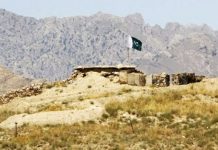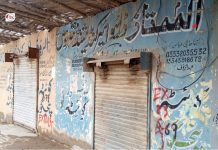Author: Shahdad Shambezai (TBP Staff member)
Zamuran is a sub-tehsil of district Kech in Makuran, Balochistan. It is located in north west of Kech and to the south of the bordering town of western Balochistan called Shahristan, Sarawan. This mountainous area is located to the west of Gazzi, Kaor river.
Zamuran is divided into three administrational units
1: Sub Tehsil Zamuran – This comprises of four union councils namely Badai, Naag, Siyah Geesi and Darbuli
2: Burz Zamuran – Various villages including Zaragen, Bugaan Archennan, Kapaar, Geshrdan Chur, Hejibi are located in this area. The administration of this area is controlled by Tehsil Tump.
3: Bagaan Zamuran – A small part of this area falls under western Balochistan.
Zamuran carries important historical and geographical significance in Balochistan. This area comprises of high mountains, historical castles, beautiful valleys, water springs and rocky terrain. The area is a sight of beauty in the spring. The extreme weather in the area heats up to 45 degree in summers but falls below the freezing point in winters. That is the reason one can find the date trees and apple gardens in the same farms. The area is also famous for its pomegranate, grapes, pears, mangoes, oranges and different other produces including wheat and rice. There are also trees of wild figs in the mountains and livestock farming is practiced by many locals.
The significant decrease in the rainfall in Zamuran in last few decades has adversely impacted both agricultural activities and livestock farming. The job creation by government is almost non-existent, leading many to trade Iranian fuel to pay their bills. The ever-increasing joblessness has forced whole villages to adopt this risky business, which means a tiny disruption in the business can lead to whole villages struggling to put dinner to the table.
In December 2020, the government of Balochistan announced a ban on the Iranian fuel business. The poor habitants of the rich Balochistan termed the government’s decision as the economical murder for the people of Balochistan.
We tried to find out how government’s ban has impacted the people involved in this business. However, due to fear not many were prepared to talk to us without hiding their identities.
“They have established Kartarpur for themselves but have installed barbed wires for us. Then they have the audacity to say that Baloch people are short-tempered and do not listen to us. When you snatch our livelihood, disgrace us at every few hundred meters at your checkpoints then the Baloch will surely lose their cool.” This was Dilmurad (pseudonym) who feeds his children and pays his bills through the Iranian oil business. He agreed to talk to us, but on the condition of anonymity.
This is not only the story of Dilmurad, but of all those residents of Zamuran who run the expenses of their homes by smuggling oil from Western (Pakistani administered) to Eastern (Iranian administered) Balochistan through one of the most dangerous roads.
Other than the recent ban, Dilmurad Zamurani is also angry at the disgraceful behaviour he suffers at several checkpoints of Pakistani security forces from Iranian border to the Turbat city.
The bordering towns of Jaligi, Sirkezai and Abdoi has been a commercial hub for hundreds of thousands of people of Balochistan. Thousands at a time spend their days and nights without a roof and wait to get hold of few gallons of diesel or petrol. This Iranian fuel is then sold in other areas of Balochistan to make some money.
Dilmurad says, “after fending the weather and the hunger for four nights, when we managed to get some oil, we travel in caravans. But we are stopped for a night at the Frontier Corps checkpoint in Jalagi. After paying 5000 rupees per vehicle as bribe we are then allowed to cross this checkpoint. But only after few kilometres we get to another checkpoint in Peer Perahagg. We are held here for hours and after so-called verification our identity and paying 2000 rupees in bribe we manage to cross this checkpoint too.
Cleaning the dust from his head with his traditional Balochi roomal (shawl) Dilmurad continued, “then there is the FC checkpoint in Naag where we face very derogatory behaviour. The FC Subeidar at this checkpost is Arshad alias Huduk, who belongs to Punjab. He does not only stop us oil tradesmen but also mistreats women and other members of the public who use the route for ordinary movement in the area. Sometimes they are allowed to cross this checkpoint and at the other times they are forced to return.
Trying to hide his anger Dilmurad stares at the ground and continues, “after bearing the abusive language of Subeidar Arshad and bribing him we continue our journey towards Turbat. But soon later we have to go through the same behaviour once again at the Durachki Naag. Ten minutes later we reach another check post at Bahot Bazar Gilli. The kind Subeidar does not demand bribe here but asks each one of us if we have seen any Baloch terrorists (Baloch “freedom fighters”) in the area. We cross this checkpoint with an artificial smile on our face. But twenty minutes into our journey we come face to face the soldiers in full war uniform at Alandor cross. The same episodes of waiting for hours, investigatory questions, the abusive languages and the bribing is played at this checkpoint before we could continue our journey again.”
When we asked Dilmurad why he still continues to be part of this business after such hardships, he said, “we start our journey from Zamuran to Turbat and this takes us quite a few days. We face several difficulties including suffering from derogatory and abusive behaviour. We nearly pay half of our earnings in bribes. We are going through all this so that our children do not die from hunger as we do not have any other sources of income. But were all these difficulties not enough that now the sole source of our income is being banned by the government. Why do not they kill us at once rather than in episodes?”
Dilmurad believes the ban on this business will be very catastrophic for the economy of this poor region. He pleaded Akhter Mengal and Dr Malik that if they cannot get them rid of the abusive behaviour of the FC then at least they should play a role to stop the ban on the business.
The agitated Dilmurad said, “for the 70 to 80 thousand population of Zamuran, there are five big FC camps and more than 28 check posts, where the locals are mistreated, and the military officers earn good money through bribes on daily basis. Balochistan is a golden bird, but we the true owners of this land are dying of hunger.”
The authorities have not only banned the oil business, but new fencings are being installed on the disputed border between western and eastern Balochistan. The FC personnel forcefully take labour work from the traders like Dilmurad. The drivers and other members of public are forced by FC to help them in installation of these fences. Baloch nationalist organisations do not approve the border between Iranian and Pakistani administered Balochistan and term it an arbitrary line that “divides the people of Balochistan”.
When we asked Dilmurad how these fences are going to impact the daily life of the locals, he said, “relatives of locals in Shamsir, Basad, Eshoi, Thahdeem, Darbuli, Kangan, Gurban, Metha, Sang, Dumbani, Thahthani Ghethan, Kasoi, Siay Gesi, Maloi, Talaan Sir, Garbun, Sirkeezay, Hathuk, Naag, Khan Kalag Badai, Poganzan, Sadhem, Ispethin Gir live on the both sides of the border. We travelled in the area for centuries without any difficulties. But now Zamuran is being separated with barbed wires. On one hand this will make it impossible to meet our relatives and on the other hand it will destroy our livelihood. We are already poor, but these new measures will bring us to the brink of death. We cannot do anything but to plead them to stop this human catastrophe from unfolding.”
Balochistan is already home to several complicated issues. The ban on the livelihood of poor people and fencing of Baloch areas will only fuel the beliefs that Balochistan is being treated as a colony by the state authorities.





























